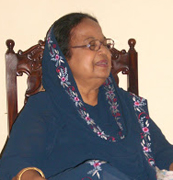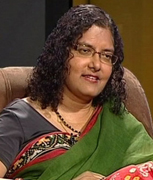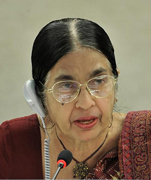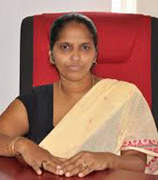What women want
From repealing of restrictive laws to equality and
justice, women’s groups outline what they want included in the new
constitution :
by Isuri Kaviratne
The constitution making process has over the past few weeks seen the
country waking up to a new realty about citizen’s rights, needs and
responsibilities. In what has been a participatory endeavour, citizens
as individuals and members of various organisations have put forward
their suggestions, demands and recommendations to the Committee of
Public Representations on the Constitution, tasked with gathering public
opinion. So how exactly are the women responding to the constitution
making endeavour and what do they want included in the new constitution?
|

Jazeema Ismail, former Chancellor of South Eastern
University
- gptd-srilanka.blogspot.com
|

Kumudini Samuel, Programme/
Research Associate of Women and Media Collective (WMC)
- vimeo.com |
The Mannar women’s action groups want the constitution to protect
women’s rights from personal laws. This is one of their recommendations.
Behind the demand is the tale of discrimination that keeps the woman
shackled dependent on the males in her family.
In the broader spectrum of legal provisions concerning women in Sri
Lanka, in addition to personal laws, the ‘pre-existing laws dated pre
1977 Constitution too discriminate women, especially under the Land
Development Ordinance that prevents them from inheriting land. Most of
the actions that were taken by successive governments to uplift the
status of women, such as the Women’s Rights Charter in 2007 and signing
the Convention on the Elimination of All Forms of Discrimination against
Women (CEDAW Convention) in 1990, are not legally binding as they have
not been incorporated into domestic law.
The 25% quota for women representation at Local Governments was
achieved by increasing the number of seats, which indicates those
already in power want to ensure their position in Local Governments
remain intact. This situation is glaring indicator of the resistance,
both subtle and overt, those agitating for a quota system in Parliament,
including the women’s group, would need to breach no matter the promises
and pledges.
According to Kumudini Samuel, Programme/ Research Associate of Women
and Media Collective (WMC), in the 15 districts WMC have so far
conducted preliminary meetings collecting suggestions, women have, apart
from raising concerns that are specific to their areas and affect their
personal lives, been near unanimous in a single request – the
establishment of an independent women’s commission.
Independent women’s commission
Women from Gampaha had want to strengthen workers’ rights, with
better protection for migrant workers and those employed in the Free
Trade Zone. Women from Mullaitivu and Kilinochchi had been concerned
about disappearances, social and economic protection for women headed
households, and better access to livelihoods. Batticaloa women had
inquired about economic rights of women as well as land and property
rights. And in Kandy, women had raised concerns about conditions in the
plantation sector.
|

Prof. Savithri Gunasekera, former Dean of the Faculty of Law
at the Colombo University - tamilweek.com
|

Dr. Anusha Edirisinghe Deputy
Director of the Centre for Gender Studies at the University
of Kelaniya - www.kln.ac.lk |
And for the future, they had also wanted a mechanism to review all
new laws even after post enactment. According to Samuel, the women’s
groups had also asked for 30% political representation for women in
politics.
Most of the women’s groups had requested the constitution to protect
their bodily integrity and sexual and reproductive rights and freedom
from violence, ranging from street harassment to domestic violence.
“The constitution should guarantee the discriminatory laws in
practice, including stereotyping of women and the way in which it
impacts, are reviewed, laws repealed and practices discontinued,” Samuel
said.
In what could be termed a response to the demands made by the women,
Jazeema Ismail, former Chancellor of South Eastern University and former
Principal of Muslim Ladies College, said any reforms made, including the
ones that concern a small group of people in the country, such as gender
equality in personal laws, should be done after having discussed openly,
in a public forum.
In partnership with men
“I do not believe in the concept of demanding special benefits for
women because anything to do with women should concern everybody,” she
said, explaining that the demands should be mainstreamed and achieved in
partnership with men. For example, she said, the men who are already in
power should assist with the movement towards increasing political
participation of women.
Lack of implementation should be punished too, she said, adding,
there should be a mechanism to constantly supervise, and monitor the
implementation of the law, failing which the parties responsible should
be penalised.
|
Women
recommend
“If a person throws a stone at a bus, it is non-bailable offence,
charged under damaging public property. But if a man rapes a woman, he
get bail immediately,” Mahalakshmi Gurushanthan from Mannar Women’s
Development Federation said, pointing out gaps in the law. Bailing out
rapists pose a threat to the victimised women and consequently,
obstructs justice.
Presenting the Federation’s recommendations in Colombo this week, she
requested rape to be a non-bailable offence, while calling for social
and economic security for woman heading households; a women’s court in
every district and cases to be heard in private; 50% political
representation and 30% women included from the national list; and
women’s commission to be an independent entity with authority to
investigate cases without State influence.
While making recommendations on resettlement policy for the
internally displaced and the abolition of the Prevention of Terrorism
Act to ensure a life free from torture, the women’s groups made specific
recommendations pertaining to women.
Rajini Chandrasekaran from Jaffna recommended that gender equality be
strengthened in the constitution, personal laws amended to ensure gender
equality, sex-work be legalised to provide the women with better
security, a trust-fund be created to assist women subjected to violence
and rape, mandatory clause to provide parents’ marriage certificate when
applying for the child’s birth certificate be removed along with salary
disparity between men and women. Juwairiya Mohideen from the Muslim
Women’s Development Trust said Muslim personal law has seen no colour of
reform though suggestions have been given under each section.
It continues to violate the Fundamental Rights Chapter of the
constitution and it is still ignored, she said, explaining that the
Trust had recommended hearing of sexual and domestic violence cases be
expedited and appropriate punishment for people who are not implementing
the law.
Shreen Saroor from Mannar Women’s Development Federation said the
constitution should give the choice for two Muslims to marry under the
general law, without making it mandatory for Muslim marriages be
performed under Muslim Personal Law. |
Prof. Savithri Gunasekera, former Dean of the Faculty of Law at the
Colombo University said the current Constitution already contains laws
for the protection of women, only if they are better implemented. For
example, the Prevention of Domestic Violence Act 2005 includes good
provisions but barely meets the desired level of implementation, she
said.
She suggested the judiciary should be empowered to review
legislation, especially regarding pre-existing laws, and make
recommendations to the government to eliminate discriminatory clauses
and provisions.
Even for the constitution, there shouldn’t be anything special for
women, she said the protocol dictates that the Committee on
Constitutional Reforms should uphold gender balance, and starting from
that point, strengthen gender balance and reduce the gap between men and
women to ensure equality. “For example, strengthening the Fundamental
Rights Chapter of the constitution, provisions on governance will
benefit women. Strengthening democracy in a country is beneficial for
all its citizens and that’s the good starting point,” she said. However,
Gunasekera said the women’s quota for the political representation is an
ongoing issue that needs firm regulations.
Deputy Director of the Centre for Gender Studies at the University of
Kelaniya, Dr. Anusha Edirisinghe said the introduction of a quota system
for women in politics should be consistent and sustainable, and should
be implemented properly.
“Women experience more hardships than men. But there are women in
Parliament already who are not addressing those issues. They haven’t
raised any concerns about not having a quota for women either,” she
said, pointing out that women who are already in Parliament should
address real issues women face. “At least to have a retired female
professor elected to Parliament under the national list would be great,”
she added.
|

